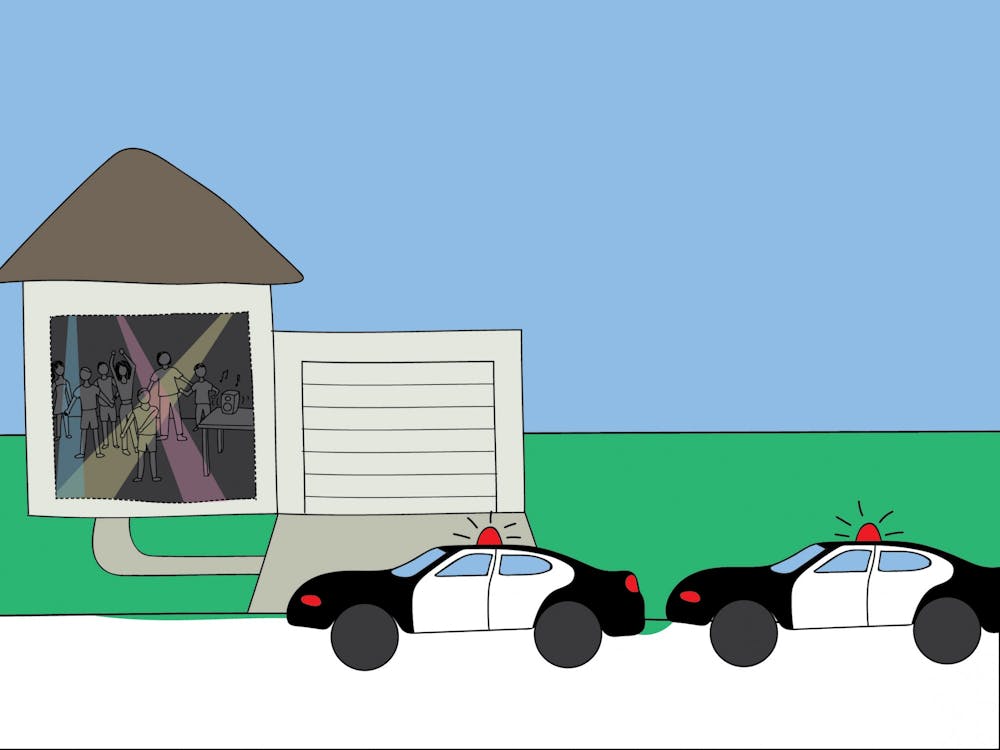For years, Durham residents have had to deal with disruptive parties held by Duke students. A Durham Police Department initiative aims to change that.
The initiative, which began at the beginning of the academic year, lays out guidelines for officers dealing with off-campus parties, according to DPD officer John Wagstaff. While officers have discretion in how to respond to a call, students who live in a house that is the site of a noise complaint or other violations will be given a warning on their first offense, be enrolled in Durham’s misdemeanor diversion program on the second and get cited or arrested on a third violation, or if they fail to complete the program.
The idea is to “keep students clean from having a record, but ultimately change behavior,” said Wagstaff, who developed the program. Before the initiative, officers would typically give residents a warning, which might not change their behavior, or cite them for a noise, alcohol or other violation, which residents consider harsh because it leaves students with a record.
Wagstaff, who developed the initiative, suggested using the misdemeanor diversion program to address the problem. According to a document summarizing the initiative provided by program coordinator Kelly Andrews, the program allows first-time, non-violent offenders to complete a “community diversion program based on individual needs and the referral reason”—such as some community service, Wagstaff said—instead of facing prosecution.
The program takes individuals between the ages of 18 and 26—now that 16 and 17-year-old individuals are no longer charged in adult criminal court in North Carolina—with older adults participating at law enforcement discretion, Andrews wrote in an email to The Chronicle.
The initiative came after DPD officers met this summer with members of Durham Neighborhoods United, a group formed by residents in 2013 to coordinate their response to disruptive parties. At the meeting, DNU members expressed frustration about an increase in disruptions over the past year, said DNU acting chair Alisa Johnson.
Johnson emphasized that the diversion program is “educational, not punitive.”
While residents “want the parties to quiet down, and they basically want them to stop,” she said, “they’ve not been particularly excited about doing anything or starting any kind of process that could be damaging to the future of students.”
After DPD developed the initiative, DNU rewrote their protocol for residents who report off-campus parties.
The protocol tells residents that they can “express [their] desire for enforcement action and encourage the use of the Durham County Misdemeanor Diversion Program” when they talk to police officers. It also encourages them to talk to students before they call the police.
DPD officers visited locations with a history of disruptions early in the semester to tell them about the program and ask for feedback, and officers met with representatives of Duke Student Affairs, including Dean of Students Sue Wasiolek and the Interfraternity Council, to discuss the program.
“DPD and [Duke University Police Department] have worked together over the years to respond to complaints about students in a very reasonable and fair way,” Wasiolek wrote in an email to The Chronicle.
IFC President Harrison Labban, a senior in the Pi Kappa Alpha fraternity who lives off campus, called the initiative “really gracious.”
“I think it fits in between, in that space where Durham residents have rights that should be respected, but they also understand that a lot of the students who are living in Durham are living in homes for the first time in three years, if not more, ” he said in an interview. “And so there’s a bit of a learning curve there.”
As of Dec. 10, residents of two houses had been enrolled in the misdemeanor diversion program, according to Wagstaff. He wrote in an email to The Chronicle that, by his estimation, DPD has seen fewer calls for complaints since the program was implemented, and residents have reported that “student neighbors are doing a better job minimizing noise.”
DPD was planning a statistical review of the program midway through the academic year and again at the end of the year, Wagstaff said in October.
Johnson said that Durham residents are “extremely happy and very pleased” with the initiative.
“It just brings a lot of peace and quiet to people who had been really troubled by these houses,” she said.
Loralie Bible, who lives in Durham’s Morehead Hill neighborhood next to a house rented by Duke students, said the family uses earplugs to sleep when there is a party next door. Her children have seen “students doing beer funnels off the top of the roof,” she said.
“The new protocol to me feels very helpful, because it seems like a consistent way to enforce the rules and give everyone a fair chance,” Bible said.
She said that a resident called the police on the house when this year’s residents held a disruptive party a few weeks into the semester. The residents quieted down after they were warned by the police—as of December, they had only held small gatherings at the house, Bible said.
But she cautioned that it is too early to draw conclusions about the program’s impact.
“Time will tell over the next few years, because what we’ve been missing is kind of a consistent enforcement of boundaries,” she said.
Correction: An earlier version of this story misstated the name of DNU's acting director. It is Alisa Johnson, not Alicia Johnson. The Chronicle regrets the error.
Get The Chronicle straight to your inbox
Signup for our weekly newsletter. Cancel at any time.
Matthew Griffin was editor-in-chief of The Chronicle's 116th volume.

